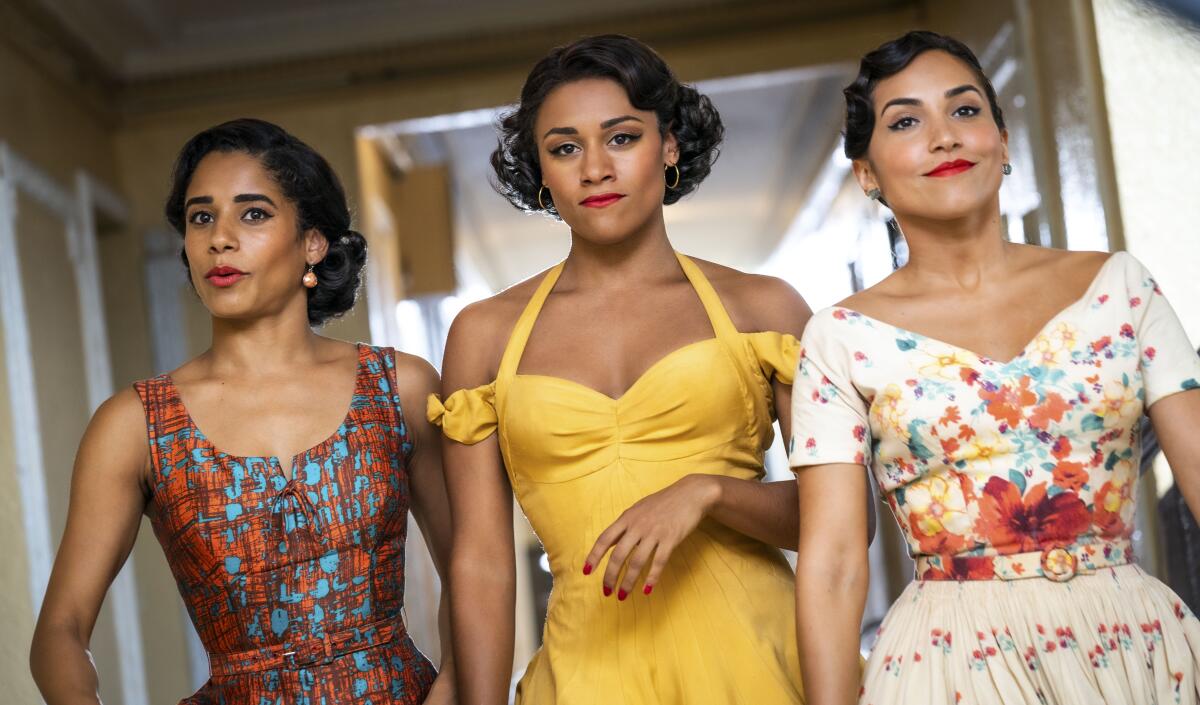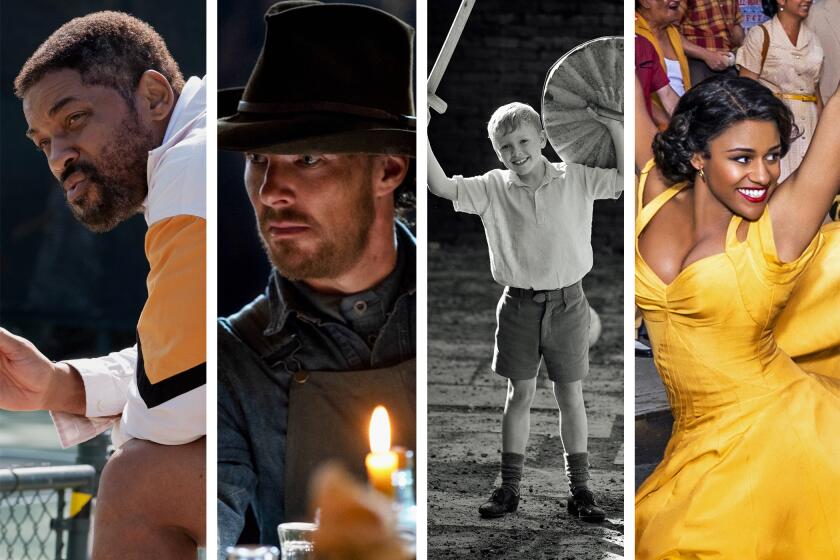Here’s how Oscar nominee Ariana DeBose could make history

She’s already in some exclusive clubs, but if newly minted Oscar nominee Ariana DeBose (of “West Side Story”) won, she’d join more.
She and Rita Moreno, who won the Oscar for playing the same role (Anita) in the 1961 version of “West Side Story,” are now among the rare pairs of actors to be nominated for playing the same character. They have a chance to become only the third pair to both win.
“That’s a really, really exclusive club,” she said. “I’m honored ... I think it [proves] multiple interpretations, all of them are valid. Variety is good! I think we should normalize that. Exciting!”
DeBose told The Times she hadn’t been able to call anyone, including her mother, with the news because her phone was preemptively blowing up.
“They’re not giving me the chance. My mom called while she was in class because she’s a teacher. All I heard was ‘Waaaaaaa!,’ ” she said, simulating her mother’s students’ excitement. “Her kids were clapping in the background; she said, ‘We have to go learn some history, but I love you, goodbye!’ ”
She’s a supporting actress nominee alongside Jessie Buckley (“The Lost Daughter”), Kirsten Dunst (“The Power of the Dog”), Judi Dench (“Belfast”) and Aunjanue Ellis (“King Richard”).
DeBose got the nod for her renewal of the iconic role, Anita, which won an Oscar for eventual EGOT honoree (and DeBose’s castmate in the Steven Spielberg remake) Moreno in the 1961 film version of “West Side Story.”
A Tony nominee for “Summer: The Donna Summer Musical” and a co-star of recent musical projects “The Prom” and “Schmigadoon!,” DeBose has been the betting favorite, according to multiple online oddsmakers, since shortly after the movie came out; her position has only improved throughout awards season as she has cleaned up among critics groups, including her December win with the Los Angeles Film Critics Assn.
The actress boldly put her own stamp on the beloved character, using elements that were essentially her own. In an interview with The Times, she said that during the audition process, she told a room with large names such as Spielberg and screenwriter Tony Kushner in it, “‘I’m Afro-Latina, and that would inform everything about this character, by virtue of how she would walk through her community. If you’re not interested in exploring that, you shouldn’t hire me.’ And Tony was like, ‘OK, let’s go.’”
Of the powerful physicality and full menu of nonverbal communication with which she outfits the role, DeBose said: “You should feel her in the room before you hear her. You don’t need to hear her to know how she feels about something.” She told The Times that Anita is able to eventually accept her surrogate daughter Maria’s love for the man who killed Anita’s love because, “Anita knows the greatest act of love is to exhibit forgiveness in the face of extreme grief. At the heart of everything, Anita was trying to build pure love ... That turn was about forgiveness.”
Yet when the actress got the news of her nomination (on a walk with her best friend), she didn’t move a muscle: “Absolute stillness and calm,” she told The Times. “Complete gratitude. I stopped what I was doing, there was no movement.”
Should DeBose win the Oscar, she and Moreno would join the impressive, exclusive club of pairs of actors to win for playing the same character. The only others: Marlon Brando and Robert De Niro as Vito Corleone (“The Godfather” and “The Godfather Part II,” respectively); and Heath Ledger and Joaquin Phoenix as the Joker (in “The Dark Knight” and “Joker,” respectively). She and Moreno would be the first women and performers of color to accomplish the feat.
Our BuzzMeter experts tell us what films and performances will win on Oscar night. Think you can do better?
There have been several other instances of actors nominated as the same character, a club to which she and Moreno now belong (though they are the first performers of color in the group). Among them: John Wayne and Jeff Bridges as Rooster Cogburn (Wayne won for the original “True Grit”); Laurence Olivier and Kenneth Branagh as King Henry V in their versions of “Henry V”; and Anthony Hopkins and Frank Langella as Richard Nixon in “Nixon” and “Frost/Nixon,” respectively.
Dench and Cate Blanchett were also each nominated for their takes on Queen Elizabeth I — in the same year, 1999 — for “Shakespeare in Love” and “Elizabeth,” as supporting and lead, respectively. Dench proved less is more, winning the Oscar for only eight minutes of screen time. Blanchett was also nominated for the role in the sequel, “Elizabeth: The Golden Age,” making her one of a handful of actors nominated twice as the same character.
Dench was also nominated along with Kate Winslet for playing the same character in the same film as Iris Murdoch in “Iris.” Winslet was also nominated alongside costar Gloria Stuart for both playing the protagonist Rose in “Titanic,” making Winslet the only actor to accomplish the feat twice.
The actress also joins lead actress nominee Kristen Stewart (“Spencer”) as rare openly LGBTQ acting nominees.
“It’s everything,” said DeBose. “Representation is something I really talk about. I believe if young people can see themselves in the media they consume, then it shows them they have possibilities. It’s one of the reasons this moment is so special.”
Then she paused and yelled at her phone, “Stop texting me!”
More to Read
From the Oscars to the Emmys.
Get the Envelope newsletter for exclusive awards season coverage, behind-the-scenes stories from the Envelope podcast and columnist Glenn Whipp’s must-read analysis.
You may occasionally receive promotional content from the Los Angeles Times.











